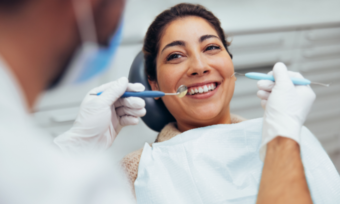How Much Does Teeth Whitening Cost In Australia?
Teeth whitening treatments continue to prove popular in Australia, but the cost can take a bite out of your budget.

Teeth whitening treatments continue to prove popular in Australia, but the cost can take a bite out of your budget.
Key points:
- Australia has a wide variety of over-the-counter whiteners and professional whitening services available.
- In-chair teeth whitening can cost anywhere from $500 to $2000 per session.
- Take-home teeth whitening kits can cost anywhere from $300 to $600.
Your smile is often one of the first things people notice about you. It’s one reason why cosmetic dental procedures, such as teeth whitening, are so popular. But how much does it cost to get it done?
When carried out successfully, teeth whitening can help remove stains and give you a brighter smile. With a wide variety of over-the-counter whiteners and professional whitening services available in Australia, we’ve shone a light on what’s involved and the various costs you can expect.
How much does teeth whitening cost?
The cost of teeth whitening can vary, depending on whether you opt to have the procedure done in a dentist’s chair, which is typically more expensive, or use an at-home whitening kit. If you opt for a teeth-whitening procedure in a dentist’s office, the cost can be anywhere from $500 to $2,000 per session, based on the advertised prices of various teeth-whitening clinics around the country. If you opt for an at-home kit from a clinic, then the cost can vary from $300 to $600, again based on prices advertised by various clinics around the country. You can also purchase a set of teeth whitening treatments over the counter from a pharmacy or chemist, and a survey of retailer websites found that these can be sold starting from around $30.
Does private health insurance cover teeth whitening?
Medicare does not normally cover dental procedures, and as tooth whitening is usually regarded as a cosmetic procedure (also not covered by Medicare), you will most likely have to pay for tooth whitening out of your own pocket, The exception can be if you have extras cover through private health insurance, which includes dental procedures. The best way to know for sure is to get in touch with your health insurance provider. Compare extras cover and private health insurance on Canstar’s database.
What is professional teeth whitening?
Professional whitening is a commonly available procedure that involves bleaching teeth to lighten their colour. After treatment, your teeth will look a few shades whiter, but not usually brilliant white. Teeth whitening is optional and rarely a necessity.
If you’re interested in teeth whitening, speak to your dentist to see if your teeth are suitable. Teeth whitening is not recommended for some people – for example pregnant women or those who have sensitive teeth, and it won’t work on crowns, veneers and fillings. Teeth whitening may be offered by businesses that aren’t dentists, such as beauty and hair salons. However, teeth whitening treatments that can be sold over the counter or performed by non-dentists are not as strong (and not always as effective) as those you’ll get from a dentist.
The Australian Dental Association (ADA) warns that teeth whitening dentist services involve the use of strong chemicals, and this can bring risks. These include chemical burns to the gums and lips, and sensitivity or pain affecting the teeth. As only registered dentists can legally use the most concentrated whitening solutions, tooth whitening may be a procedure best left to professional dentists. The upshot is that it’s worth speaking with a qualified dentist to determine if tooth whitening is safe for you, as well as giving you access to the most effective treatment options.
How are teeth whitened?
Teeth whitening involves applying a bleach solution, which soaks through the top layer of enamel on your teeth (the tough outer shell) and into the dentine (the main supporting bony structure of your teeth). The solution reacts to the coloured molecules that have been causing the discolouration of your teeth. The dentine then becomes lighter, causing your teeth to look whiter. When it comes to the options offered by dentists, there are two main methods: in-chair power bleaching and tray bleaching (take home):
In-chair power bleaching
Power bleaching, also known as laser whitening, is done at the dental surgery. The dentist will apply a bleaching agent to your teeth, then shine a laser light into your mouth to activate the whitening process. The treatment may take 60 minutes, and you may only need one treatment.
Tray bleaching
Your dentist will create moulds of your teeth to make trays that fit over them like a mouthguard. Bleaching gel is put into the trays, which you wear in your mouth for 15 to 30 minutes – something that can be done at home. You’ll likely notice results in two to four weeks.
Compare Health Insurance (Hospital and Extras) with Canstar
The table below displays some of our referral partners’ hospital and extras policies for a 39-year-old single female seeking cover in NSW without pregnancy cover. The table is sorted by Star Rating (highest to lowest) followed by provider name (alphabetical). Use Canstar’s health insurance comparison selector to view a wider range of products. Canstar may earn a fee for referrals.
 Heart and vascular
Heart and vascular
 Colonoscopy
Colonoscopy
 General dental
General dental
 Physiotherapy
Physiotherapy
 Heart and vascular
Heart and vascular
 Colonoscopy
Colonoscopy
 General dental
General dental
 Physiotherapy
Physiotherapy
 Heart and vascular
Heart and vascular
 Colonoscopy
Colonoscopy
 General dental
General dental
 Physiotherapy
Physiotherapy
 Heart and vascular
Heart and vascular
 Colonoscopy
Colonoscopy
 General dental
General dental
 Physiotherapy
Physiotherapy
 Heart and vascular
Heart and vascular
 Colonoscopy
Colonoscopy
 General dental
General dental
 Physiotherapy
Physiotherapy
Products displayed above that are not “Sponsored or Promoted” are sorted as referenced in the introductory text to the table. Canstar may receive a fee for referral of leads from these products. See How We Get Paid for further information. If you decide to apply for health insurance, you will deal directly with an insurance provider, and not with Canstar.
Consider the provider’s detailed product and pricing information before making a decision to purchase a policy. The products displayed on this page do not include all providers and may not compare all features relevant to you. View the Canstar Health Insurance Star Ratings Methodology and Report. The rating shown is only one factor to take into account when considering products.
For more information, read our detailed disclosure, important notes and additional information.
Is taking a ‘dental holiday’ to whiten your teeth a good idea?
According to online dental resource Dental Guide Australia, up to 10,000 Australians jet off each year for dental procedures, attracted by the potential savings of up to 75% on the cost of domestic treatment. If you plan to do this, though, then it’s important to be confident in the clinic that will provide the procedure, and the competence of the staff. The ADA warns that dentists practising overseas may not have the same high level of training as Australian dentists. In addition, the ADA says that antibiotic resistant ‘superbugs’ are being seen more often in Australia, as people return from overseas clinics that didn’t have to follow the same high standards of infection control as Australian dental practices.
Another factor to consider is that dental whitening may require more than a single visit to the dentist. The ADA cautions that trying to squeeze several complex dental procedures into a typical holiday means you may be risking complications.
What’s the difference between professional and over-the-counter whitening?
Plenty of Australians searching for a sparkling smile are taking a do-it-yourself approach to tooth whitening by buying products/kits available in pharmacies or online. As noted, professional whitening systems have a much stronger concentration of the whitening agent, and dentists have the light systems needed for greater activation of the whitening agent.
In addition to the possibility of less effective results, over-the-counter teeth whitening products can bring risks such as burns to gums, extreme pain if bleach enters a tooth cavity, damaged enamel and an uneven result.
How long does professional teeth whitening last?
Professional whitening is not a permanent fix and will need to be maintained, possibly with touch-up treatments needed at 6-12 monthly intervals. That said, it’s likely to last longer than a DIY solution, which uses weaker chemicals.
The length of time a whitening treatment lasts may be affected by the same factors that caused the discoloration in the first place, including:
- Smoking.
- Drinking heavily pigmented beverages such as red wine, coffee and tea.
- Not practising good oral hygiene.
If you stick to a ‘white’ diet and avoid colourful foods and drinks this will help your teeth stay whiter and brighter. This is especially true immediately after professional tooth whitening when the pores in the enamel are still open, making them more susceptible to staining.
Are there any risks involved in teeth whitening?
As with any medical or dental procedure, big or small, there can be side effects of teeth whitening, such as sensitivity and mild gum irritation. It’s also not recommended if you are pregnant or breastfeeding, have gum disease, cracks or exposed dentine.
 Psychiatric services
Psychiatric services
 Rehabilitation
Rehabilitation
 General dental
General dental
 Physiotherapy
Physiotherapy
 Psychiatric services
Psychiatric services
 Rehabilitation
Rehabilitation
 General dental
General dental
 Physiotherapy
Physiotherapy
 Psychiatric services
Psychiatric services
 Rehabilitation
Rehabilitation
 General dental
General dental
 Physiotherapy
Physiotherapy
 Psychiatric services
Psychiatric services
 Rehabilitation
Rehabilitation
 General dental
General dental
 Physiotherapy
Physiotherapy
 Psychiatric services
Psychiatric services
 Rehabilitation
Rehabilitation
 General dental
General dental
 Physiotherapy
Physiotherapy
 Psychiatric services
Psychiatric services
 Rehabilitation
Rehabilitation
 General dental
General dental
 Physiotherapy
Physiotherapy
Canstar may earn a fee for referrals from its website tables, and from Sponsorship or Promotion of certain products. Fees payable by product providers for referrals and Sponsorship or Promotion may vary between providers, website position, and revenue model. Sponsorship or Promotion fees may be higher than referral fees. Sponsored or Promoted products are clearly disclosed as such on website pages. They may appear in a number of areas of the website such as in comparison tables, on hub pages and in articles. Sponsored or Promoted products may be displayed in a fixed position in a table, regardless of the product’s rating, price or other attributes. The table position of a Sponsored or Promoted product does not indicate any ranking or rating by Canstar. For more information please see How We Get Paid.
Cover image source: Izabela Magier/Shutterstock.com
Talk to a health insurance specialist to find the policy that suits your needs
This article was reviewed by our Editor-in-Chief Nina Rinella before it was updated, as part of our fact-checking process.

Alasdair Duncan is Canstar's Content Editor, specialising in home loans, property and lifestyle topics. He has written more than 500 articles for Canstar and his work is widely referenced by other publishers and media outlets, including Yahoo Finance, The New Daily, The Motley Fool and Sky News. He has featured as a guest author for property website homely.com.au.
In his more than 15 years working in the media, Alasdair has written for a broad range of publications. Before joining Canstar, he was a News Editor at Pedestrian.TV, part of Australia’s leading youth media group. His work has also appeared on ABC News, Junkee, Rolling Stone, Kotaku, the Sydney Star Observer and The Brag. He has a Bachelor of Laws (Honours) and a Bachelor of Arts with a major in Journalism from the University of Queensland.
When he is not writing about finance for Canstar, Alasdair can probably be found at the beach with his two dogs or listening to podcasts about pop music. You can follow Alasdair on LinkedIn.
- How much does teeth whitening cost?
- Does private health insurance cover teeth whitening?
- What is professional teeth whitening?
- How are teeth whitened?
- Is taking a ‘dental holiday’ to whiten your teeth a good idea?
- What’s the difference between professional and over-the-counter whitening?
- How long does professional teeth whitening last?
- Are there any risks involved in teeth whitening?
 Psychiatric services
Psychiatric services
 Rehabilitation
Rehabilitation
 General dental
General dental
 Physiotherapy
Physiotherapy
Try our Health Insurance comparison tool to instantly compare Canstar expert rated options.
Talk to a health insurance specialist to find the policy that suits your needs






